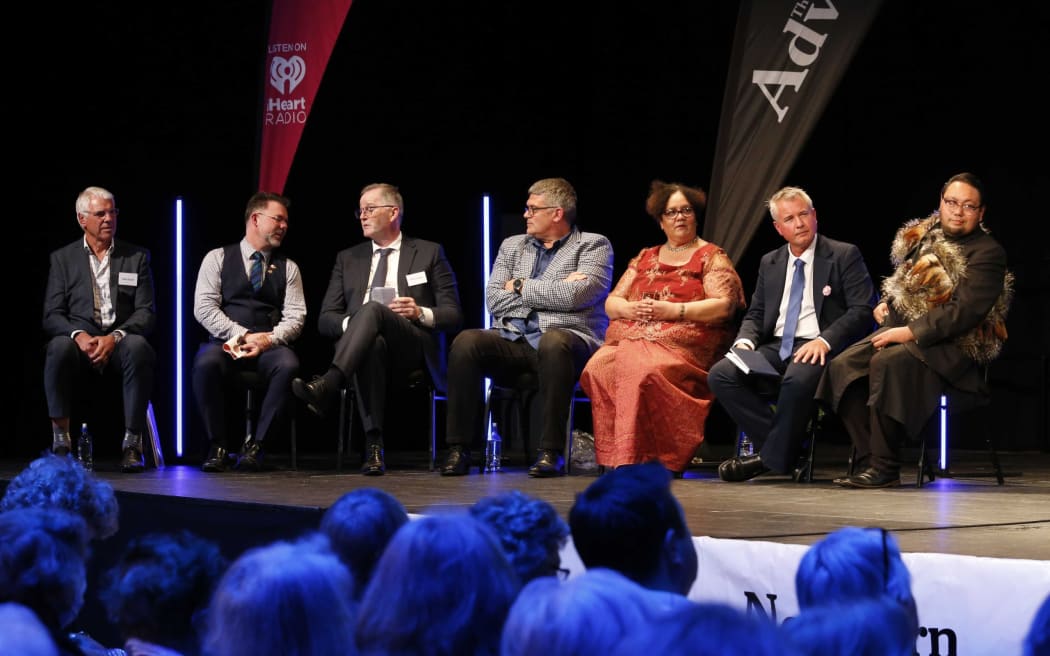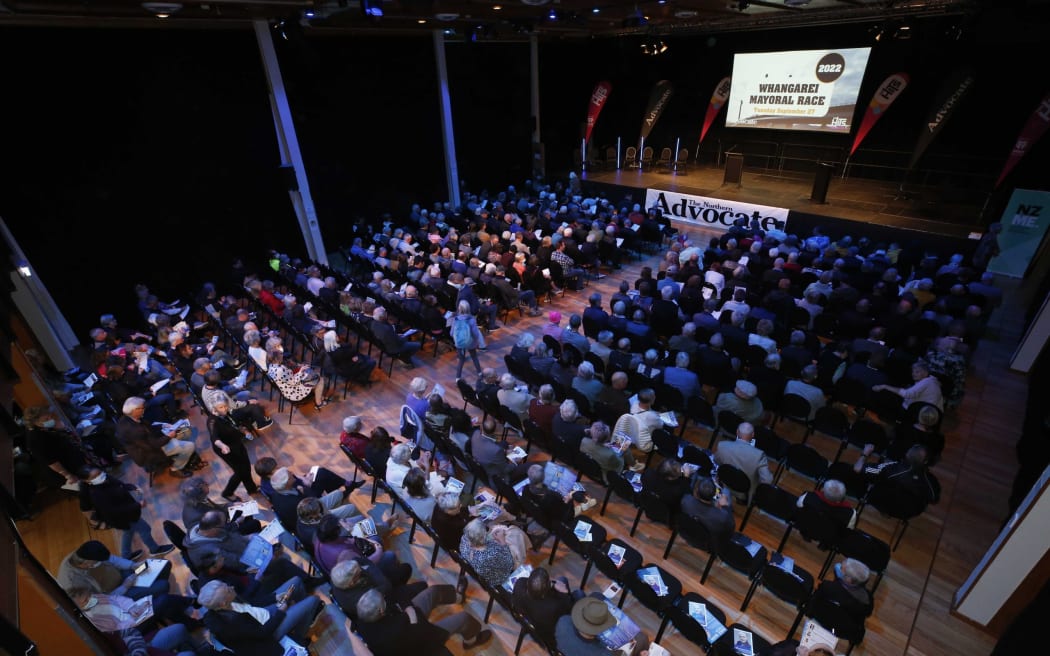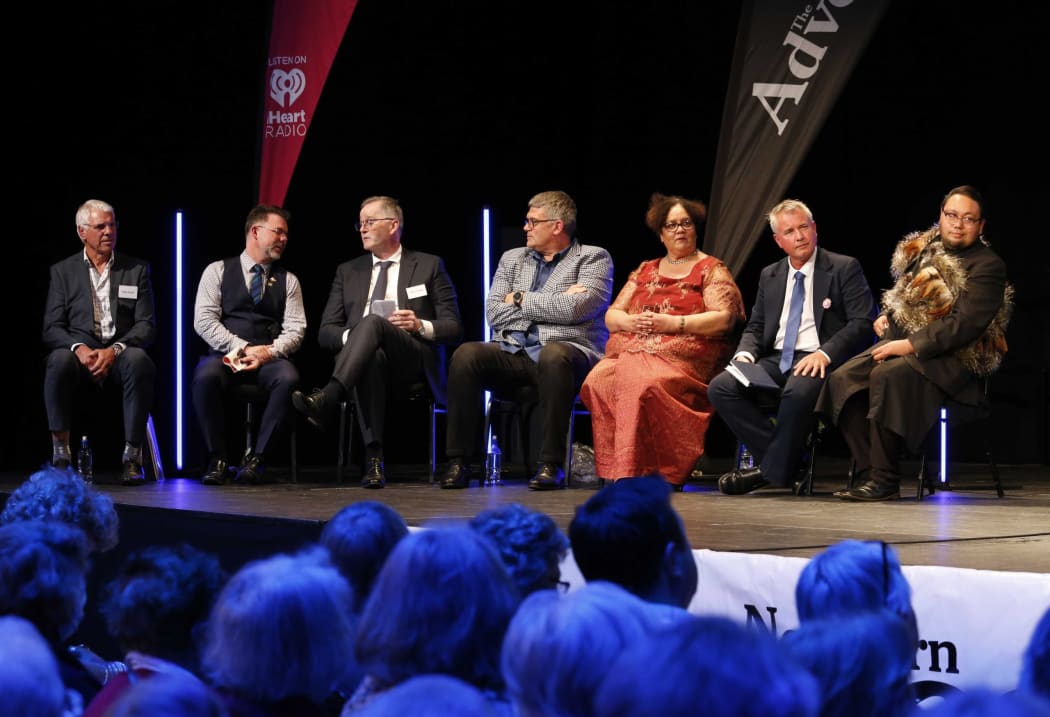
Whangārei’s seven would-be mayors, from left: Mike Budd, Vince Cocurullo, Ken Couper, Brad Flower, Fiona Green, Nick Jacob and Shaquille Shortland.
Photo: Northern Advocate / Michael Cunningham
Whangārei’s would-be mayors have universally spoken against the government’s current three waters plans.
The five men and one woman universally spoke against the proposals at Whangārei’s biggest meet-the-mayoral-candidates meeting.
Five hundred people were at the packed meeting in Forum North’s exhibition hall, one of Whangārei’s largest public meeting venues, that was filled to overflowing. The meeting was organised by the Northern Advocate and the Hits radio station.

In less than two weeks one of the six candidates – Mike Budd, Vince Cocurullo, Ken Couper, Brad Flower, Fiona Green, Nick Jacob and Shaquille Shortland – will become Whangārei mayor after the 8 October local government elections.
Candidates said they were against government proposals to take $1.5 billion of Whangārei District Council (WDC) three waters assets and put them into a giant top-of-New Zealand water services entity currently known as entity A. The government restructuring plan will see three waters infrastructure divested from WDC, Far North District Council and Kaipara District Council and combined into entity A, along with that from Auckland Council.
Candidates such as Cocurullo and Jacob adamantly said no to three waters.
Cocurullo said WDC’s $1.5 billion of three waters assets belonged to the ratepayers of the district. The council managed these assets on behalf of the community.
“In my view, it’s (three waters) creating a division among people,” Cocurullo said.
Others such as Couper were less definite in the meeting saying the government had recognised there was a problem with wastewater, stormwater and drinking water infrastructure that needed to be fixed, but it had been too quick in trying to bring this fix in within just three years.
Couper said a solution was needed for Northland as there was currently sewage running into Northland harbours, where wastewater treatment plants were not meeting required resource consent standards.
He said Whangārei ratepayers would be subsidising three waters costs for the Far North and Kaipara if the region’s three district councils operated into the future without Auckland Council as part of the new picture.
Shortland (28) said he was 99 per cent against three waters.
He said the one percent he was more in favour of was the co-governance that featured with three waters. Whangārei’s crest included his ancestor Pohe and Anglican Reverend Samuel Marsden. Both worked together to solve challenges.
Shortland said he did not trust the government to adequately protect assets such as three waters. Three waters could better be managed locally through co-governance, he said.
Budd said 75 per cent of WDC’s asset value was tied up in three waters. Removing these assets from the council balance sheet reduced its ability to borrow against them to fund development.
Flower said solving three waters restructuring was not simply about changing the government at the next election in 2023. No new government came in and overturned the previous government’s developments such as three waters. It would be a case of the new government tweaking what was already in place and then selling it.
Green said Whangārei should “blinking well not” be handing over its three waters assets.

Five hundred people turned out to the meeting.
Photo: Northern Advocate / Michael Cunningham
Meanwhile, mayoral candidates also outlined what they would do in their first 100 days in office.
They were also asked whether they were in favour of co-governance with a range of answers for and against provided. Candidates as well outlined how they would address worsening central city crime so businesses could feel safe.
On other topics, Shortland said better communication about what council was doing was needed.
Shortland said he would appoint a town crier to spread the news if he became mayor, or become one himself if elected as a councillor.
Shortland’s waiata, speaking of the importance of all people working together, held the audience spellbound.
Dealing with the major ramifications of climate change for the district and region got a small mention from the mayoral candidates’ lineup but did not feature prominently overall.
Local Democracy Reporting is Public Interest Journalism funded through NZ On Air




